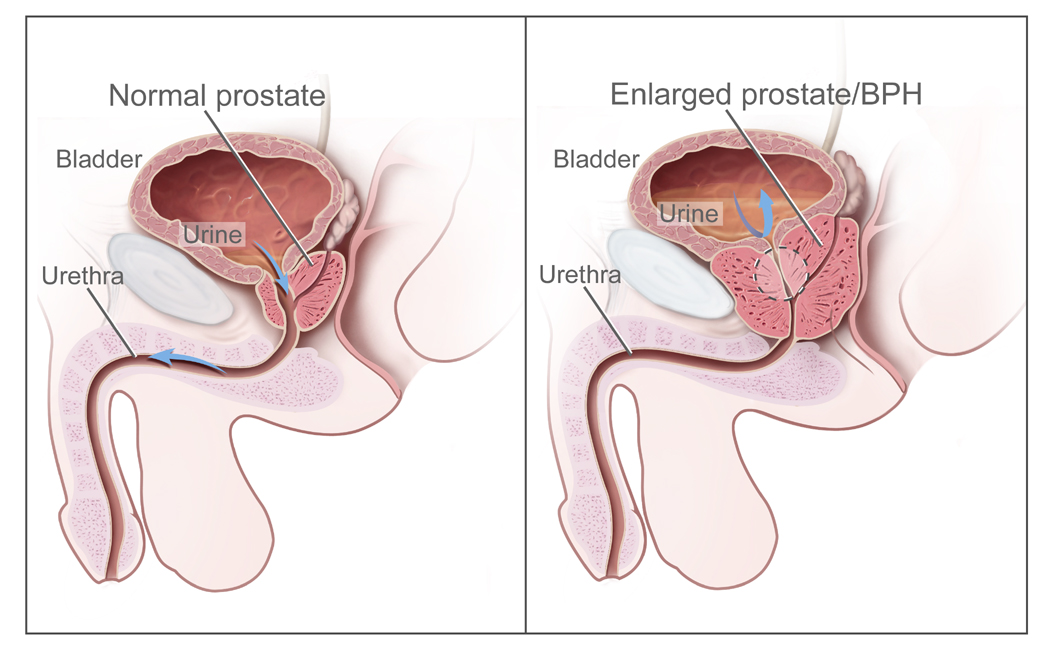ENLARGED PROSTATE GLAND
BPH / BENIGN PROSTATIC HYPERPLASIA
WHAT IS PROSTATE
Prostate is a small gland in men which is about the size of a walnut. It is located below the bladder and surrounds the tube that carries urine from the bladder (urethra). The prostate releases a fluid component of semen.
BENIGN PROSTATIC HYPERPLASIA (BPH)
Prostate problems are common in men 50 years and older. Most common among these problems is enlargement of prostate gland also known as BPH.
BPH is a non-cancerous enlargement of the prostate gland. It generally begins in men in their 30s, evolves slowly, and symptoms usually begin to appear after 50.
In BPH, the prostate gland grows in size. Since prostate sits around the urethra, its enlargement compresses the urethra. This can impede the urine flow from the bladder and can cause urine to back up in the bladder leading to the need to urinate frequently.
Other common symptoms of BPH include:
- difficulty starting the urinary stream,
- slow flow of urine,
- inability to fully empty out the bladder, and
- the need to urinate urgently.
More serious problems include urinary tract infections and complete blockage of urethra which can lead to kidney damage.
HOW TO DIAGNOSE BPH
A health care professional can detect an enlarged prostate by rectal examination. The doctor can also examine the urethra, prostate, and bladder using a cytoscopse, an instrument that is inserted through the penis, or through ultrasound. A urologist is the medical specialist who deals with urinary and prostate gland related concerns.
CAN PROSTATE PROBLEMS BE PREVENTED?
There are no guaranteed, surefire methods to prevent prostate problems. However, active lifestyle, well-balanced diet, healthy sexual life, emotional wellbeing, and regular intake of multi-vitamins and minerals play an important role in keeping glands healthy and active.
The best way to prevent prostate problems is to be aware of the symptoms. See a doctor promptly if any of the following symptoms occur:
- frequent urge to urinate
- painful urination
- difficulty passing urine
- dribbling of urine / inability to completely empty the bladder
- bloody urine
CONVENTIONAL TREATMENTS AVAILABLE FOR BPH
There are various methods available to treat BPH. However, like all medical and surgical procedures, there are side-effects and long-term ramifications for these methods. Men should carefully weigh the benefits and risks for each of these options. Prostate surgery has shown to be the riskiest of all the available treatment method and is better to be avoided for as long as possible.
Some of the conventional BPH treatments are:
- Alpha-blocker drugs such as Flomax, Uroxatral, Hytrin etc. These drugs help relax the smooth muscles of the prostate and the bladder neck which helps relieve urinary obstruction caused by an enlarged prostate. The side effects of these drugs include headache, fatigue, ejaculation problems, and lightheadedness.
- 5-alpha reductase inhibitors such as Proscar and Avodart. This drug blocks the conversion of the male hormone testosterone into its active form in the prostate (DHT). Since BPH is directly dependent on DHT, the drug can reduce prostate size over 6 to 12 months. This is why improvement in urinary symptoms takes this long while using this drug. Side effects of these drugs may include declining interest in sex, problems getting an erection, and problems with ejaculation.
- Trans-urethral Resection of the Prostate (TURP) is an invasive procedure where the patient is given anesthesia and the doctor inserts an instrument into the urethra through the penis. Doctor shaves away part of the inner prostate with the instrument to relieve the outflow of urine from the bladder.
- Laser procedures are also available, some of which can be performed with minimal anesthesia. These procedures involve the removal of obstructing prostate tissue. They generally involve less blood and quicker recovery time than TURP.
- Microwave therapy is generally performed as an outpatient procedure and involves the use of microwave energy to kill some of the prostate cells, eventually leading to the shrinking of the prostate.
NATURAL TREATMENTS FOR BPH
There are natural ways to address the BPH. Like all natural remedies, they will take longer than pharmaceutical drugs but are much safer and can actually reverse the condition as opposed to just suppressing the symptoms.
Below are some of the time-tested methods of treating BPH naturally.
DIET AND LIFESTYLE
- Consume foods rich in omega-3 fatty acids and monounsaturated fats that help to decrease inflammation of the prostate gland. Healthy choices include:
- avocados,
- cold water fish (wild salmon, sardines),
- ground flaxseeds (1-2 tablespoons daily), and
- pumpkin seeds.
- Tomatoes and tomato paste, watermelon, and cantaloupe contain the prostate friendly nutrient lycopene. It is recommended to consume 3 servings weekly.
- Diet low in starches and meats and high in vegetables and polyunsaturated fats.
- Men with BPH should avoid caffeinated beverages as well as alcohol—they irritate and inflame the prostate.
- Reduce your intake of foods that contain harmful fats such as fried foods that contain hydrogenated or partially hydrogenated oils which promote inflammation.
- Minimize your intake of dairy and red meat as they contain saturated fat which also may worsen inflammation of the prostate.
- Stay away from packaged foods that are high in sugar, which can worsen inflammation.
- Regular exercise is important in the prevention and treatment of BPH. For example, a study in the Archives of Internal Medicine reported that men who walked two to three hours a week had a 25% lower risk of developing BPH.
HERBS THAT HELP RELIEVE BPH SYMPTOMS
- Beta-sitosterol
- Saw Palmetto
- Pygeum (warning: it can cause upset stomach)
- Rye Grass Pollen Extract
- Stinging nettle (warning: may cause mild side effects such as upset stomach and skin rash)
- Quercetin
- Damiana
- Hydrangea
- cayenne pepper is reported to alleviate the symptoms of a swollen prostate rather quickly
All of these herbs are highly effective however they need to be taken under the guidance of a naturopath or an herbalist to avoid any possible side effects or interference with other drugs.
HOME REMEDIES
The following remedies have been in use for generations and are highly effective in treating early stages of BPH.
- Apple Cider Vinegar (ACV)
Add 1 tablespoon of unfiltered ACV in a glass of water or juice, once or twice a day. You can increase the dose gradually if necessary.
- Blackstrap Molasses & Baking Soda
Mix 1 teaspoon of molasses and 1 teaspoon of baking soda, and take once daily. Increase the dose gradually to up to 3 times daily if necessary.
AYURVEDIC TREATMENTS
- Triphala Powder
- Take 1 tbsp of triphala powder
- Add it to 250 ml of boiling water
- Boil for 20 min
- Strain the liquid; drink when lukewarm
- Indian Gooseberry + Turmeric Powder + Honey
- Cut, de-seed and crush 10-12 Indian gooseberries (also known as Amla)
- Add a pinch of turmeric powder
- Add 2 teaspoon of honey
- Mix well and have 1 tablespoon of this mixture early in the morning
Recipe:
Recipe:
Multivitamins/Mineral Blend
I cannot stress enough the importance of having adequate amount of vitamins and minerals in your diet for the healthy functioning of any gland. It is almost impossible to receive adequate amount of these vitamins and minerals through the modern diet. No matter how healthy you eat, I would highly recommend investing in your health by buying high quality multi-vitamins.
For the optimal health of prostate gland, choose the multivitamins that contain lycopene, Vitamin D, pomegranate juice, and omega-3 fatty acids, as these supplements have been shown to have a protective role in the prevention of prostate cancer.
Invest in your health and your wellbeing. There is nothing more precious worth protecting.

